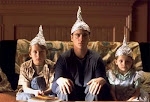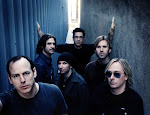 From the producer of Knocked Up and 40 Year Old Virgin comes Superbad, a movie about three high school guys, Seth, Fogell and Evan, who embark on a journey of self-discovery, sex and booze. This film is loaded with comical scenarios that are so wrong, it’s funny!
From the producer of Knocked Up and 40 Year Old Virgin comes Superbad, a movie about three high school guys, Seth, Fogell and Evan, who embark on a journey of self-discovery, sex and booze. This film is loaded with comical scenarios that are so wrong, it’s funny!
Many people embrace the idea that “bad is good” during high school and never grow out of this for the rest of their lives. Somehow high-schoolers learn that the only way to feel right is to do that which they know in their consciences to be wrong. Anyone brave enough to resist this phenomenon is ridiculed by the cowardly majority.
Such foolishness continues on into adulthood. Adults laugh at situations that are “wrong” or “dirty.” Grown-ups brag about their super-bad deeds expecting to impress their co-workers.
Human beings desire evil naturally, therefore people try to fellowship with their peer by doing evil together. It makes sense, therefore that what’s wrong should come off as funny or cool.
Why isn’t bad called “bad” and good called “good?”
Few and far between are those who stick to what’s right for the sake of sticking to what’s right. These are the truly courageous, trustworthy and free-thinking minority. If not for the few who are bold enough to do what’s right, the world would be a terrible place to live in.
Superbad ... why not Super-good?
![]()
![]() Tags:
Superbad
Tags:
Superbad
Subscribe to:
Post Comments (Atom)

























4 comments:
Well, first of all, the use of bad in this way is a feature of African-American English. White kids try to be cool by talking how they think black kids talk, and that means picking up and using African-American dialect, including the use of "bad" not as a pejorative but as a sign of praise.
As for the notion that altruism or "goodness" is rare, well, I thought I was a misanthrope, but you seem to have surpassed me here. Are people who act decently (by the general standards of humans across cultures) really so rare? I mean, there are a lot of jerks in the world, but there are also tons of decent people out there. Their conception of ethics may not exactly fit the one your local clergyman prescribes to you, but since when are you (or your local clergyman) a transcendent authority on ethics?
If you look at most cultures, most people obey the norms of what's "acceptable" or "good behaviour" most of the time. So how is it that people who are "good" are so rare?
Thanks for your input gordsellar, i appreciate your relative level-headedness.
Obviously, there are words that have opposing meanings within themselves; it just so happens that the word "bad" (which can be used in place of "really really good") is perfect for illustrating the fact that people love that which they know in their consciences to be wrong.
When i say that people are generally evil, i'm not saying i dislike humanity... on the contrary, i try to give people the benefit of the doubt.
What i am saying is, what we desire demonstrates our nature. We naturally desire evil, therefore we are evil by nature.
What you say is true, most people tend to stay in line. But that's only because they are too afraid to explode out of their friendly facades and carry out the desires of their heart to the Nth degree.
If racism is bad, then Hitler is no worse than the average racist person who keeps their convictions bottled up and hidden.
If genocide is bad, then the average person who keeps their anger bottled up and hidden is no better than the mass-murderer. The only difference between the angry murderer and the angry person who goes to work and pays their bills like a good citizen is, the serial killer is acting out on his convictions.
Of course i'm glad that the fear of prison or the death penalty keeps them in line. But is there something better than fear to keep people in line? Is there anyone who burns with passion for what is pure, right and thoroughly admirable? I admit that even within the institutional church, such a quality of character is rare.
One last note: all those who genuinely desire justice should turn to God to find out how to go about bringing justice to the world. It is good to take action against environmental abuses, for example. But what if we were in perfect harmony with the environment? What then? People would think, "The air is clean, which is nice, but for what purpose am I breathing?"
The most effective way to change the world is from the heart-outward. That is the genius of God's gospel... it transforms people's hearts and minds.
Change people's convictions first; their actions will follow suit.
I understand you're outlook on the title of this film. It is true that people try to fellowship, especially in this case with the finals day of high school. But my question to you is this: because it is legally wrong for these characters to consume alcohol, does that mean it's wrong morally? Also, how can these characters be mature and responsible about sex, alcohol, and the opposite gender when they have no experience in that era? I believe that we have to learn from our own mistakes. Otherwise, students we be stuck in a classroom living life through a textbook and not living their lives the way they choose to live it.
I enjoy you columns. They are refreshing and original. Keep it up.
well, anonymous, the main issue here is whether or not people heed their consciences... in fact people tend to go directly against their consciences because that's what seems "cool." in my experience, doing what is good, upright, selfless, etc. leads to greater maturity than constantly compromising one's integrity. From a moral standpoint, we become stronger as we resist evil, not give in to it.
the Bible gives a good answer to whether or not we should respect the "laws of the land" even if God never specifically mentions this or that issue... the answer is: Yes, respect the laws of the land, not because they always make sense, but because God is the One who will ultimately divide the just and unjust, and pay back to everyone exactly what is due them
Post a Comment